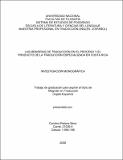| dc.contributor.advisor | Zamora Salazar, Eduardo | |
| dc.contributor.author | Retana Mora, Carolina | |
| dc.date.accessioned | 2020-08-04T18:01:50Z | |
| dc.date.available | 2020-08-04T18:01:50Z | |
| dc.date.issued | 2008 | |
| dc.identifier.other | 000248750 | |
| dc.identifier.uri | http://hdl.handle.net/11056/17795 | |
| dc.description | Maestría en Traducción Inglés-Español | es_ES |
| dc.description.abstract | La presente monografía tiene como fin principal evaluar los aportes de las memorias de traducción en la calidad del producto final y el tiempo invertido en el proceso de traducción. En primera instancia, se explora en detalle, mediante una encuesta, el proceso que siguen los traductores costarricenses en lo que respecta a la elaboración y consulta de glosarios, el manejo del tiempo, el conocimiento que tienen de la tecnología disponible para agilizar los pasos anteriores y el uso de las mismas. Seguidamente, se analizan las demandas de un sector de la sociedad que requiere de traducciones especializadas y se describen las características de este tipo de texto. Posteriormente, se definen los parámetros dentro de los cuales se formula la definición de calidad para esta investigación. Lo anterior se lleva a cabo con el fin de detectar cuáles de las dificultades que enfrentan los traductores, tanto en relación con el proceso como con tipo de texto, están directamente relacionadas con las ventajas que promete el uso de la memoria. Finalmente, se presentan los resultados obtenidos a partir de un estudio empírico en el que se compara la calidad de las traducciones realizadas con la memoria de traducción y sin ella, así como el tiempo invertido en ambos procesos con el objetivo de mostrar las fortalezas y debilidades de la herramienta en cuestión. | es_ES |
| dc.description.abstract | This research paper is aimed at evaluating the contributions of translation memory systems to the quality of the final product, and to reducing the time that translators spend in the translation process. Firstly, by means of a survey, the translation process that Costa Rican translators go through is explored in detail, focusing on the preparation and consultation of glossaries, time management, knowledge about the technology available to facilitate the aforementioned steps, and its use. Afterwards, the demands of a sector that requires specialized translations are analyzed and the characteristics of specialized texts are described. After that, the parameters to establish the concept of quality used in this research are presented. All the latter is done in order to find out which of the difficulties translators are faced with, in terms of the process as well as in terms of the type of text, are directly related to the advantages provided by the use of translation memory systems. Finally, the paper sets forth the results of an empirical study which compares the quality of the target texts translated with the tool and without it, as well as the amount of time invested in both processes so that the weaknesses and strengths of the translation memory systems are unveiled. | es_ES |
| dc.description.sponsorship | Universidad Nacional, Costa Rica | es_ES |
| dc.language.iso | spa | es_ES |
| dc.publisher | Universidad Nacional, Costa Rica | es_ES |
| dc.rights | Acceso abierto | es_ES |
| dc.rights | Attribution-NonCommercial-NoDerivatives 4.0 Internacional | * |
| dc.rights.uri | http://creativecommons.org/licenses/by-nc-nd/4.0/ | * |
| dc.subject | TRADUCCIÓN | es_ES |
| dc.subject | CALIDAD | es_ES |
| dc.subject | TECNOLOGÍA | es_ES |
| dc.subject | TRADUCTORES DE LENGUAJES | es_ES |
| dc.subject | TRANSLATION | es_ES |
| dc.subject | QUALITY | es_ES |
| dc.subject | TECHNOLOGY | es_ES |
| dc.subject | LANGUAGE TRANSLATORS | es_ES |
| dc.title | Las memorias de traducción en el proceso y el producto de la traducción especializada en Costa Rica | es_ES |
| dc.type | http://purl.org/coar/resource_type/c_bdcc | es_ES |
| una.tesis.numero | 418.02 R437m | es_ES |
| dc.description.procedence | Escuela de Literatura y Ciencias del Lenguaje | es_ES |


